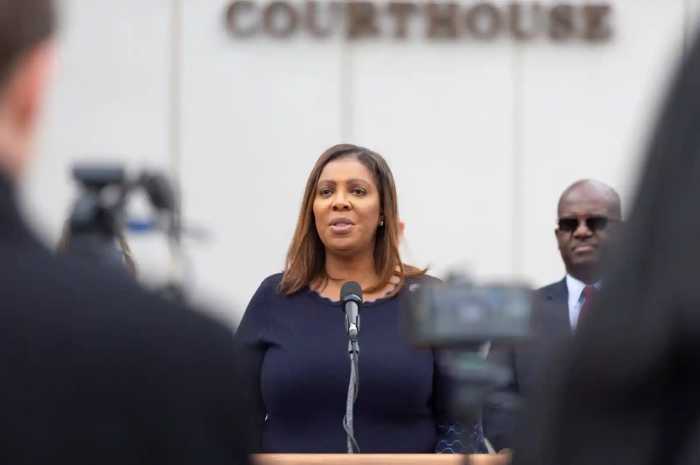In the wake of the high-profile slaying of Ecuadorian immigrant Marcelo Lucero in November 2008 and accusations of discriminatory treatment of Hispanics, the beleaguered Suffolk County Police Department and the U.S. Department of Justice entered into a settlement agreement intended to foster much-needed policy changes within the department.
Under the agreement, which the Suffolk County Legislature approved, federal monitoring of the agency potentially would’ve ceased after three years from its effective date, Jan. 13, 2014, had the department demonstrated improvements across the board. Three years later, however, the department remains tethered to the settlement despite it making “substantial progress” in implementing some of its requirements, according to the DOJ’s most recent assessment report, published on Jan. 19.
Suffolk police achieved “substantial compliance” in the area of hate crimes and hate incidents training—subjects garnering much scrutiny before and after the Lucero murder.
“In other areas,” the report stated, “considerable work remains.”
One such area DOJ inspectors identified for improvement is the way in which the department collects traffic stop data. In its latest report, monitors noted that Suffolk police “omits critical variables that are necessary for meaningful analysis of bias-free policing,” including the reasons for initiating a traffic stop.
Continued oversight of the department comes amid a March 21 memorandum issued by U.S. Attorney General Jeff Sessions to department heads and U.S. Attorneys across the country calling for a review of “compliance reviews, existing or contemplated consent decrees, and task force participation.”
Court-mandated consent decrees compel offending agencies to comply with federal directives. Out of court agreements, such as that issued in Suffolk County, are essentially contracts between two parties. Nationwide, there are currently 14 consent decrees and four out-of-court settlements aimed at reforming troubled police departments. Perhaps the most notable Obama-era consent decree involves the Ferguson Police Department, which became ground zero for large anti-police brutality demonstrations following the fatal police shooting of 18-year-old Michael Brown.
“All consent decrees currently in place would be subject to review” following Sessions’ memo, a DOJ official told the Press. Whether “review” means retreat from Obama administration policies remains unknown, though if Baltimore is any example—the DOJ under President Trump recently sought a delay in a consent decree stalling rehabilitation there—the latter is likely. Whether the review extends to the out-of-court settlement agreement between the DOJ and SCPD is also unclear.
Without federal compulsion to implement the aforementioned improvements, it’d be up to Suffolk County Police Department brass to continue the progress initiated by the DOJ—directives imposed for a reason.
“These aren’t taken on lightly,” explained John DeCarlo, assistant chair of the Department of Criminal Justice at the University of New Haven. “The DOJ doesn’t come in and say ‘Hey, we want to do a consent decree.’ They’re not picking on anyone.
“They’re there because there are substantial problems,” he continued. “Sometimes it’s not within the capability of the local political system to make the changes needed.”
Aside from the legal settlement, Suffolk police is under a long-standing consent decree related to its hiring practices, the same with neighboring Nassau County police.
A Justice Department spokesman did not address the 2014 agreement specifically, but in a statement said the memo was issued at a time of “new leadership in the Department actively developing strategies to support the thousands of law enforcement agencies across the country that seek to prevent crime and protect the public.”
“The Department is working to ensure that those initiatives effectively dovetail with robust enforcement of federal laws designed to preserve and protect civil rights,” the statement added. “While this memo includes the review of any pending consent decrees, the Attorney General also recognizes the Department’s important role helping communities and police departments achieve these goals.”
Over the course of the agreement, SCPD welcomed a new commissioner, Tim Sini, who vowed to reform the agency after its former chief of department, James Burke, shamed the department. The disgraced ex-chief pleaded guilty last year to conspiracy charges stemming from a precinct beating of a shackled burglary suspect. The suspect, Christopher Loeb, stole a duffel bag from Burke’s SUV containing sex toys, porn, a gun, ammunition and other items. According to federal investigators, Burke, who was sentenced to 46 months in prison, orchestrated a coverup and attempted, but ultimately failed, to stymie the FBI’s investigation.
As for Sini, the tall task of turning around a department embarrassed by scandal fell squarely on his shoulders. But at the same time, Sini had to mend the relationship with the FBI after Burke’s puzzling decision in 2012 to unceremoniously remove three detectives from the FBI’s Joint Long Island Gang Task Force, despite its resounding successes tackling violent local street gangs. The SCPD has since rejoined the collaborative unit, and Sini stood alongside DOJ officials and his local and state counterparts at a press conference in March announcing the arrest of 13 members of the MS-13 gang for seven murders and racketeering, among other alleged crimes.
More relevant to the federal government’s scrutiny of the department was the arrest of Suffolk police Sgt. Scott Greene for stealing money from mostly Hispanic drivers. Greene’s arrest was announced 18 days after the settlement went into effect. Greene was eventually convicted of petty larceny, official misconduct and grand larceny, but acquitted on the most serious hate crimes charges.
“I am particularly outraged by the conduct of this officer who was sworn to protect the community but instead targeted individuals who he perceived to be vulnerable,” former SCPD Commissioner Ed Webber said at the time.
‘EPIDEMIC OF HATE CRIMES’
This was all happening amid greater scrutiny of local law enforcement agencies nationwide under the Obama administration.
From the time he came into office, former President Obama’s DOJ sued 14 police departments and agreed to four out-of-court agreements with four agencies, including Suffolk police, according to The New York Times. As evidenced by Sessions’ memo, the Trump administration is not expected to pursue oversight of local police departments as vigorously as his predecessor.
In fact, they appear to be doing the opposite. Without explicitly stating in the memorandum his intention to roll back, or perhaps even squash such reforms, Sessions declared:
“The Federal government alone can not successfully address rising crime rates, secure public safety, protect and respect the civil rights of all members of the public, or implement the best practices of policing. These are, first and foremost, tasks for state, local, and tribal law enforcement.”
Among a list of ways to “effectively promote a peaceful and lawful society society, where the civil rights of all persons are valued and protected” ensure successful policing, Sessions’ memorandum states: “Local control and local accountability are necessary for effective local policing. It is not the responsibility of the federal government to manage non-federal law enforcement agencies.
“The misdeeds of individual bad actors should not impugn or undermine the legitimate and honorable work that law enforcement officers and agencies perform in keeping American communities safe,” it continues.
Sini, a former federal prosecutor who has been commissioner for 14 months, inherited a department plagued by the scandal-scarred Burke and accusations of discriminatory policing tracing back years.
In November 2008, Latino Justice, an immigrant advocacy group, wrote a letter to the Civil Rights Division of the Justice Department detailing allegations of discriminatory policing in Suffolk. The letter was deeply critical of Suffolk County’s treatment of Latinos, going as far as declaring “an epidemic of hate crimes against Latinos had erupted in Suffolk County.”
The DOJ first announced an investigation in 2009 after predatory teenagers viciously killed 37-year-old immigrant Marcelo Lucero in Patchogue, which brought Suffolk County into the national spotlight for all the wrong reasons. The Lucero slaying was predated by two similarly vicious attacks: the kidnapping and beating of two Latino men in Farmingville by white men posing as contractors in 2000, and the 2004 burning of a Latino family’s home. A climate of fear had enveloped the Hispanic community, advocates said, with many afraid to report crimes to the police because of their questionable immigration status or distrust of law enforcement.
A Sept. 13, 2011, letter from the DOJ’s Civil Rights Division addressed to former Suffolk County Executive Steve Levy noted that it was investigating, among other allegations, that “SCPD engages in discriminatory policing, that its approach to the Latino community discourages Latino victims from filing complaints and cooperating with the police, and that the Department fails to investigate crimes and hate-crime incidents involving Latinos.”
Two years later, the DOJ and Suffolk police agreed to the current settlement, which was negotiated out of court and included 29 reforms currently guiding changes within the department. The areas for improvement include bias-free policing, hate crimes and hate incidents, training, and language assistance.
Even with allegations swirling against Greene for targeting Hispanics and the circus spawned by Burke’s cantankerous reign, the police department has managed to come into varying degrees of compliance since the DOJ stepped in.
During a hearing before the Suffolk County Legislature’s Public Safety Committee last week, Sini told lawmakers that the department was in “compliance” with 28 of 29 of the recommendations. In reality, the police department has only achieved “partial compliance” with regards to 21 of the DOJ provisions, compared with seven such provisions in which monitors found the department to be in “substantial compliance.”
According to the agreement, the DOJ assessment won’t be over until the county “has maintained substantial compliance with all provisions” for the previous 12 months. Sini indicated that he’s prepared to open discussions with the DOJ about “how to move forward.”
Sini’s assessment aside, the DOJ’s January report suggested its mandate that SCPD achieve full compliance remained unchanged. The report was published one day before President Donald Trump’s inauguration. Sessions wasn’t confirmed as Attorney General until Feb. 8.
SCPD MONITORING MOVES FORWARD
“Over the coming year, we will focus our attention on the Department’s efforts in the substantive areas of the Agreement with which the Department remains in partial compliance,” the DOJ said in the Jan. 19 assessment, adding that it will release public reports on its observations in both the spring and fall of 2017. According to a law enforcement source close to the matter, members of the DOJ toured SCPD headquarters in Yaphank this month and recently held a meeting with members of the community—standard procedures for a compliance evaluation.
A spokesperson for the U.S. Attorney’s Office for the Eastern District declined to comment on Sini’s statements to the Pubic Safety Committee. A spokesman for Suffolk police did not respond to multiple requests for comment for this story. Following a request for response from the Press regarding inoperable links to the DOJ settlement on SCPD’s website, the hyperlinks were activated, though no explanation was provided.
A former chief of the Branford Police Department in Connecticut, New Haven University’s DeCarlo has studied settlement agreements, and said it can take years for a department to come under full compliance. For example, the Detroit Police Department was under federal monitoring for 13 years before its consent decree expired last year. In the case of East Haven Police Department in Connecticut, federal monitors pulled out after the department met compliance standards after three years, explained DeCarlo.
“They don’t have to be perfect and they don’t have to have 100-percent compliance, but they want to have movement,” DeCarlo told the Press, speaking broadly about settlement agreements. “The feds aren’t being unreasonable—and it’s all about policy, about changing your policy and changing the patterns and practices of what you’re doing. If you’re doing stuff that you’re not supposed to be doing or is not in the best interest of the community, they want you to change it.”
DeCarlo reviewed the DOJ’s most recent assessment of the SCPD and said the recommendations do not appear to be unfair.
“If the community is not happy with the cops, and the bias is perceived, then that’s bias,” DeCarlo said. “Whether you’re intending to do it or not, if you do not appear legitimate as a police department in the eyes of the community that you’re there to serve, then you’re biased.”
DeCarlo noted that a successful transition from police department under scrutiny to one making serious reforms depends on not only the willingness of the agency to achieve its goals, but also backing from local officials. He said departments may perceive federal monitoring in a negative light at first, but taken retrospectively, settlement agreements could prove beneficial to the department—and the community it serves.
“Change is hard, and police departments, like all pieces of government, are bureaucracies,” he said.
Whether the DOJ under Sessions will unilaterally back out of the agreement remains to be seen. But if their intention is to give SCPD its independence, there may not be any obstacles to prevent them from doing so, said Christopher Dunn, associate legal director for the New York Civil Liberties Union.
“If the DOJ was what prompted it, and they just walk away from it, that’s probably just the end of it,” said Dunn, speaking broadly about out-of-court agreements, as is the case in Suffolk.
Joselo Lucero, Marcelo’s younger brother, said that a premature exit from the settlement agreement would be unwise considering increased anxiety among immigrants with fear of deportations under the new presidential administration.
Lucero meets with both Suffolk police and the DOJ periodically. Among the foremost issues he discusses with the DOJ is language access, which the DOJ’s Jan. 19 report graded as in “partial compliance” and requiring further improvements.
“I think it should continue,” Lucero, outreach coordinator at the nonprofit Hagedorn Foundation, told the Press. “I cannot tell you for how long, but until the community feels safe and feels comfortable to talk to the police…the fear to be arrested by immigration is a big issue right now.”
In his conversations with Sini, Lucero was told that SCPD doesn’t recognize Immigration and Customs Enforcement (ICE) detainer requests and only complies when a warrant for a particular person in custody has been issued.
According to Suffolk police policy documents amended last April, non-US citizens cannot be detained “solely pursuant to a request from ICE” and “such detention shall only be conducted pursuant to a warrant.”
As for how the administration now compares to the one in power when his brother was tragically killed, Lucero said the difference is stark.
“If you go back 10 years ago, it was worse, really, it was worse against immigrants,” he said. “This administration has made progress.”
In public, Sini has displayed an openness to work with the community. During press conferences related to the recent MS-13 slayings, he has reiterated that a person’s immigration status would not be impacted if they came forward with information about crimes. And during two press conferences about four bodies found in a Central Islip park, a Spanish-speaking interpreter was present to translate the commissioner’s comments.
Sini also told the Suffolk County Legislature’s Public Safety Committee the department is making it easier for members of the Hispanic community to file complaints with Internal Affairs investigators. Doing so, he said, is good for transparency.
Legis. Robert Trotta (R-Fort Salonga), a former Suffolk police detective and one-time member of the Long Island Gang Task Force, said the department had always been involved in community relations, but to a lesser extent than it is now.
“I think the department is in a way better place than what it was,” Trotta said, attributing much of its rehabilitation to Burke’s downfall. “The bar was set so low that it’s doing much better. The guys are hard working, they’re trying to get the job done. There’s always a couple of bad apples in any bunch.”
That the police department has been more engaged and is making progress is clear in the report. But, as the DOJ’s Jan. 19 assessment notes, there’s still more work to be done.
If Lucero had it his way, the DOJ-led monitoring would continue until the department met all its requirements.
“I don’t see why they have to finish with this settlement, especially now, when the community is under attack,” he said.


































